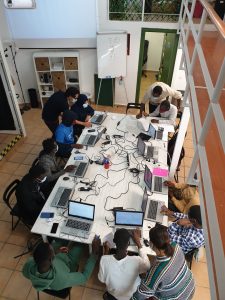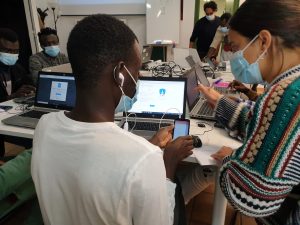By Hugo Jovel, Madrid For Refugees
Processing and administrative delays in host countries can leave people experiencing Forced Displacement (FDPs – Forcibly Displaced Persons) in limbo, unable to access education systems, employment opportunities, and job re-training, resulting in a loss of skills, confidence, and self-esteem (Morrice, 2012). Specific educational needs, like a lack of digital skills, can further hamper FDPs’ integration into host societies, considering how information technologies are relied upon for everyday tasks, like finding an address, talking to relatives, and accessing banking services.

Back in late 2019, before the break out of the COVID-19 pandemic, Madrid For Refugees started running a digital literacy program directed toward the adult FDPs in the area. The pilot program consisted of three students with diverse backgrounds, experiences, and technological know-how. The 12 sessions focused on transferring smartphone use knowledge into using a desktop computer, a likely common scenario, as academic research has shown that many FDPs can use smartphones. However, running apps and having a mobile device as the only means for accessing the internet can result in fragmented knowledge that cannot cope with more complex digital problem-solving skills (Potocky, 2021).
During the pilot courses, the diverse skill levels of the students were noticeable from the get-go and thus became problematic when dealing with retention. Finding a balance for the class meant that revisions to class plans were constant, adjusting for the advances of one student to keep their interest while taking care of another student’s struggles, assuring that they did not fall behind. One of the tools that improved engagement was to have the most advanced student explain or lead an exercise. By taking a more active participatory role, the student doubled down on their new skill while helping others catch up to the following levels in the course. Of course, this engagement relays heavily on the group’s chemistry.
We run our digital literacy courses in Spanish, and we recommend students have at least an A2/B1 level of Spanish to sign up. Nonetheless, we also identified language barriers as a potential struggle for retention rates, especially when one of the students does not share another common language with the rest of the group. While these students were actively present during class and had a generally good disposition during the course, informal conversation with the rest of the group was difficult, opening feelings of isolation.
While overtaking potential language barriers during class can be especially difficult while progressing through lessons, encouraging interaction and asking questions to keep all students involved in activities can help built a sense of fellowship. Organizers can also screen groups that account for potential language difficulties, assigning students with common languages together.
In our experience, careful attention during student recruitment can also help curve class desertion. FDPs are often eager to sign up for courses; however, scheduling conflicts are the most common cause of student desertion across all our programs. Regardless of their interest, spontaneous opportunities, like seasonal employment, relocation, and other workshops or training programs, may take precedence. While controlling for all possible scenarios is impossible, carefully screening student candidates can help mitigate mid-course scheduling conflicts. Clear communication with candidates or caseworkers during recruitment is also paramount, detailing course lengths, class schedules, and end dates and explaining that spots are limited and require a serious commitment. We have also established a policy that students fail out of courses after three unjustified no-shows. While flexible in practice, this policy has contributed to driving home the notion that sign-up entails commitment and that the organization’s resources and volunteers’ time are well used.
Class desertion can affect other students, volunteer commitments, and organizational goals. Working with FDPs requires flexibility and quick thinking. Continued sharing of practices among organizations can help fine-tune internal policies and help mitigate common problems.
References
Morrice, L. (2013). Learning and Refugees: Recognizing the Darker Side of Transformative Learning. Adult Education Quarterly, 63(3), 251–271. https://doi.org/10.1177/0741713612465467
Potocky, M. (2021). The Role of Digital Skills in Refugee Integration: A State-of-the-Art Review. The International Journal of Information, Diversity and Inclusion 5(5), 69–108. https://doi.org/10.33137/ijidi.v5i5.37514




